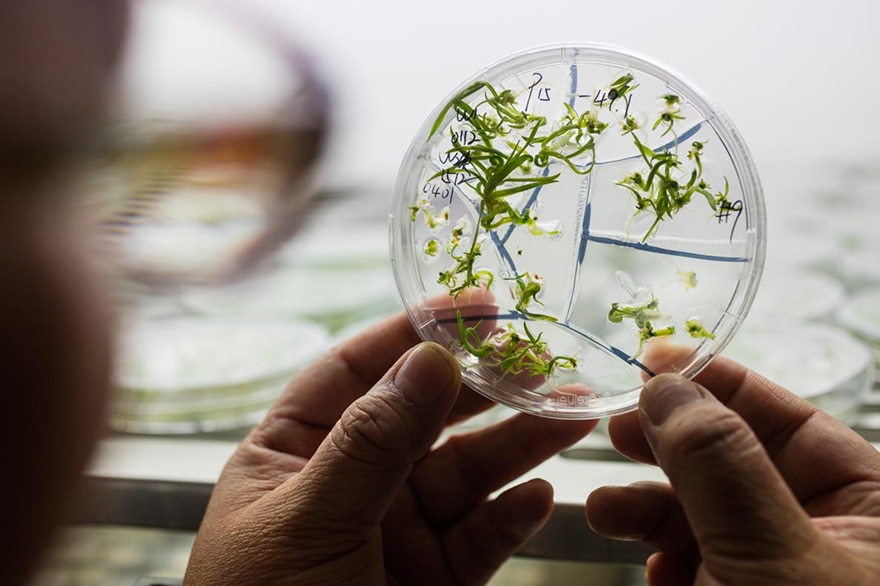How do you protect crops from diseases, insects and other pests when pesticides have a serious sulphur smell? Scientific research proposes to modify plants using genetic editing resources. Biotechnology advocates swear that these modified plants are not GMOs and pose no risk to human health, biodiversity or the environment. Debates in Europe on this issue are well underway to protect consumers as much as possible and to implement the precautionary principle intelligently. The United Kingdom has decided to stop asking itself these dilemmas. Freed from European constraints by the magic of Brexit, the British are freeing themselves from these discussions and are proposing without delay to welcome and develop new genetic editing technologies on their soil.
Asked about the potential of biotechnology and gene editing in the "farm to table" (F2F) strategy, the EU's new flagship food policy, Health Commissioner Stella Kyriakides said: "The European ship needs innovative solutions to overcome its dependency on pesticides." However, innovative technologies must be safe for consumers and the environment. Moreover, they must bring real added value to our society,"she said.
The debate rages on
The debate on biotechnology and innovation has long been a hot topic in Europe. Indeed, the subject has gained momentum following a ruling by the European Court of Justice (ECJ) in 2018, which ruled that organisms obtained through gene editing were genetically modified organisms (GMOs) and that they should, in principle, fall under the directive on the deliberate release of genetically modified organisms into the environment.
While environmental activists have welcomed the ECJ's decision, the agricultural sector has sounded the alarm, highlighting its negative consequences on the economy and the environment. Therefore, at the request of the EU Council, the European Commission conducted a study on new genomic techniques. According to Ms Kyriakides, the study will assess the state of these techniques and possible policy action in this area will only be analysed after the study is completed in 2021.
Tassos Haniotis, director for strategy, simplification and policy analysis at the European Commission's Directorate-General for Agriculture and Rural Development (DG AGRI), said that we "take for granted that the use of biotechnology, nanotechnology, and artificial intelligence is not a problem. However, when it comes to food or pesticides, our standards differ".
Some traditional parties have expressed support for these new tools. Socialist MEP Paolo De Castro suggested that the EU was at an impasse, as the EU executive was not considering new regulations to differentiate between genetic editing and genetically modified organisms. "Frans Timmermans - one of the members of the college behind the F2F strategy - needs to understand that farmers don't like to use chemicals, but they are forced to use them to fight diseases [...] What kind of tools are we giving them to find alternatives?"he wonders.
The Verts/ALE Group, initially sceptical about the use of genetic editing, now seems to be divided on this issue. Some German Green politicians have recently supported the idea of reviewing the regulation of this practice. However, officially, the European party denies any about-turn.
The policies of the European Conservatives and Reformists Group (ECR) are more critical. ""Despite demand from industry, farmers and the Member States, the European Commission has been unable to clarify GMO legislation since the beginning of 2007," said MEP Tertsch Hermann. "We are in 2020, time is running out and we are already behind when we analyse the regulatory status of GMOs around the world," he said, adding that 'farm to table' or biodiversity strategies will not be successful. Farmers do not have adequate tools to produce food while improving their environmental performance.
"While pesticide reduction is a pillar of European strategies, we cannot accept that genomic publishing and CRISPR technology are not fully recognized as key elements in achieving environmental objectives in the agricultural sector. Coronavirus has highlighted that medical biotechnology is part of the solution and that we should also give agro-biotechnology a chance," he stressed.
Stakeholders are divided on the need for new or amended regulations on GMOs. Opponents argue that new regulations would be time-consuming and ultimately harmful to farmers.
For the seed industry, the legislation needs to be changed. "If the ECJ can only interpret the current legislation (definitions and exemptions) in this way, then it must be amended or rewritten to ensure that all plant genetic innovations do not fall by default under the scope of the current directive, which is cumbersome, costly, politicized and therefore dysfunctional," said Garlich von Essen, Secretary-General of Euroseeds.
"If a plant product can either be developed naturally or by plant breeding methods, and does not contain any foreign DNA, then it should not be considered a GMO and therefore should not be subject to the EU Directive. If a plant product contains foreign DNA, a transgene, then it should be subject to this directive," he added.
UK turns to genetic publishing
While the EU seems to get tangled up in these discussions, the UK is taking advantage of its post-Brexit benefits, including the freedom to speed up decision-making in line with scientific advances.
In London, the debate on the use of gene editing has been heating up since the introduction of an amendment to the British Farm Bill that could provide British scientists and farmers with access to these new technologies. The bill, which is expected to be one of the major upheavals in the 40-year history of British agricultural policy, is currently being debated in the House of Lords.
The amendment follows an exchange between the British All-Party Parliamentary Group on Agricultural Science and Technology and George Eustice, the Secretary of State for the Environment, Food and Rural Affairs, calling on the government to highlight genetic innovations after Brexit.
During the reading of the bill on July 9, 2020, several Lords sided behind genetic editing. Lord Gardiner of Kimble, Parliamentary Under-Secretary of State in the Department for Environment, Food and Rural Affairs, stressed that it was "paramount that robotics and genetics offer great potential for the development of agriculture", arguing that "innovation and technology are the keys to increasing productivity while improving the environment and feeding a growing world".
At the same time, Lord Blencathra announced that he was "looking forward to changes in UK legislation, once the Brexit is finalised, so that we can get down to genetic editing", arguing that it was "very important to act quickly once the official exit from the EU".
However, the amendment has also attracted the wrath of a number of British environmental organisations. According to them, genetically modified organisms are not attractive to the public. For example, three of the largest anti-GMO activist groups in the UK - GM Freeze, Beyond GM and GMWatch - are urging the public to ask legislators to reject the amendment. In their view, such changes to the structure of UK environmental protection are "at best a rash and reckless decision, and at worst a dangerous and destructive one."
Source: Euractiv












